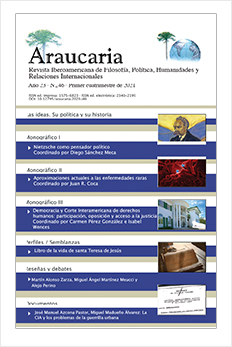Feminist perspectives about the Law and the ECHR: the case Carvalho Pinto de Sousa Morais v. Portugal
DOI:
https://doi.org/10.12795/araucaria.2021.i46.27Keywords:
Feminist Jurisprudence. European Court of Human Rights. Legal Mobilization. StereotypesAbstract
Feminist Jurisprudence have challenged the Law in a very relevant way, viewing it as a way of reproducing sexual and gender inequalities. In this paper, starting from the reflection on a specific case and the respective decisions of the portuguese courts and the European Court of Human Rights, I seek to analyse - in a space and time in which the national and international normative legal frameworks claim to be promoters of gender equality - the achievements that Law has effectively made possible and with what intensity. The perspective that moves me is based on a policy of recognition, i.e., it intends to recognise an emancipatory potential in Law, exploring the possibility of its use in feminist struggles.
Downloads
References
Ashe, Marie, “Bad Mothers and Welfare Reform in Massachusetts: The Case of Clarabel Ventura” [in Martha A. Fineman, Martha T. McCluskey (eds.), Feminism, Media and the Law, Oxford, Oxford University Press, 1997], pp. 203-216.
Bartlett, Katharine, “Gender Law”, Duke Journal of Gender Law & Policy, 1, 1, 1994, pp. 1-20.
Bartlett, Katharine and Kennedy, Rosanne, Feminist Legal Theory. Readings in Gender and Law, Boulder, CO, Westview Press, 1991.
Beleza, Teresa Pizarro, “’Clitemnestra Por Uma Noite’: A Condição Jurídica das Mulheres Portuguesas no Séc. XX”, Panorama da Cultura Portuguesa no Séc. XX, http://pt.scribd.com/doc/38948894/Clitmnestra-Por-Uma-Noite-Teresa-Beleza. 1991.
Cain, Patricia, “The Future of Feminist Legal Theory” [in Nancy Dowd and Michelle S. Jacobs (eds.), Feminist Legal Theory. An anti-essencialist reader, New York, New York University Press, 2013], pp. 14-19.
Cook Rebecca J. and Cusack, Simone, Gender Stereotyping: Transnational Legal Perspectives, Philadelphia, University of Pennsylvania Press, 2010.
Council of Europe, Overview of The Case-Law ff The European Court of Human Rights-2017, The Netherlands, WOLF LEGAL PUBLISHERS, 2018. file:///C:/Users/Madalena%20Duarte/Desktop/Short_Survey_2017_ENG.pdf.
Crenshaw, Kimberlé W.,“Mapping the Margins: Intersectionality, Identity Politics, and Violence against Women of Color”, Stanford Law Review, 43, 6, 1991, pp. 1241–1299.
Duarte, Madalena, "O lugar do direito nas políticas contra a violência doméstica", Revista Ex aequo, 25, 2012, pp. 59-74.
Duarte, Madalena, Para um Direito sem margens: representações sobre o Direito e a violência contra as mulheres, Coimbra, Universidade de Coimbra, 2013.
Duarte, Madalena, "Violência nas relações de intimidade, feminismos e direitos das mulheres em Portugal", [in Boaventura de Sousa Santos, Cecília MacDowell Santos, Bruno Sena Martins (orgs.), Quem Precisa Dos Direitos Humanos? Precariedades, Diferenças, Interculturalidades, Coimbra, Almedina, 2019].
Felsteiner, William L.F.; Sarat, Austin; Abel, Richard L. “The emergence and transforming of disputes: naming, blaming, claiming…”, Law & Society Review, 3/4, 1980-81, pp. 631-654.
Fineman, Martha Albertson; Thomadsen, Nancy Sweet (orgs.), At the Boundaries of Law. Feminism and Legal Theory, New York, Routledge, 1991.
Finley, Lucinda, “Breaking Women's Silence in Law: The Dilemma of the Gendered Nature of Legal Reasoning”, Notre Dame Law Review, 64, 1989.
Foucault, Michel, História da sexualidade I. A vontade de saber, Lisboa, Relógio d’Água 1994.
Gomes, Conceição; Fernando, Paula; Duarte, Madalena; Ribeiro, Tiago; Oliveira, Ana, Violência Doméstica: estudo avaliativo das decisões judiciais, Lisboa, Colecção Estudos de Género, CIG, 2016.
Josephson, Jyl, “The intersectionality of domestic violence and welfare in the lives of poor women”, Journal of Poverty, 6, 2002, pp. 1-20
Kapur, Ratna, “Revisioning the role of law in women’s human rights struggles” [in Saladin Meckled-García and Basak Çah (eds.), The legalization of human rights: multidisciplinary perspectives on human rights and human rights law, London, Routledge, 2006], pp. 93-107.
Kay, Fiona; Gorman, Elizabeth, “Women in the Legal Profession”, The Annual Review of Law and Social Science, 4, 2008, pp. 299-332.
Kingdom, Elizabeth F., What’s Wrong with Rights? Edinburgh: Edinburgh University Press, 1991.
Mackinnon, Catharine A.,Toward a Feminist Theory of the State, Cambridge, Harvard University Press, 1989.
Menkel-Meadow, Carrie; Diamond, Shari Seidman, “The Content, Method, and Epistomology of Gender in Sociolegal Studies”, Law and Society Review, 25(2), 1991, pp. 221-38.
Minow, Martha, “Foreword: Justice Engendered”, [in Madhavi Sunder, (org.), Gender and Feminist Theory in Law and Society, Hampshire, Ashgate, 1987], pp. 35-120.
Ribeiro, Tiago, "Violência doméstica, dinheiro e moral: a indemnização das vítimas", Barómetro Social, 2012. http://barometro.com.pt/archives/809.
Santos, Boaventura de Sousa, Pela Mão de Alice: O Social e o Político na Pós-Modernidade. Porto, Afrontamento, 1994.
Santos, Boaventura de Sousa, “Poderá o Direito ser emancipatório?”, Revista Crítica de Ciências Sociais, 65, 2003a, pp. 3-76.
Santos, Boaventura de Sousa, “Para uma Sociologia das Ausências e uma Sociologia das Emergências” [in Boaventura de Sousa Santos (ed.) Conhecimento Prudente para uma Vida Decente – ‘Um discurso sobre as Ciências’ revisitado, Porto, Edições Afrontamento, 2003b], pp 735-770.
Segal, Lynne, Out of time: The pleasures and the perils of ageing, New York, Verso, 2013.
Smart, Carol, Law, Crime and Sexuality, California, Sage, 1999.
Sunder, Madhavi (org.), Gender and Feminist Theory in Law and Society, Hampshire, Ashgate, 2007.
Taylor, Yvete, “Sexuality and Class”, Sexualities, 14(1), 2011, pp. 3-11.
Timmer, Alexandra, “Toward an Anti-Stereotyping Approach for the European Court of Human Rights,” Human Rights Law Review, 11, 2011, pp. 707-738.
Turk, Austin T., “Law as weapon in Social Conflict”, Social Problems, 23, 1976, 276-291.
Ventura, Isabel, Medusa no Palácio da Justiça ou Uma História da Violação Sexual, Lisboa, Tinta da China, 2018.
West, Robin, “Jurisprudence and gender”, University Chicago Law Review, 55 (1), 1988.
Downloads
Published
How to Cite
Issue
Section
License
Las ediciones impresa y electrónica de esta Revista son editadas por el Secretariado de Publicaciones de la Universidad de Sevilla, siendo necesario citar la procedencia en cualquier reproducción parcial o total.Salvo indicación contraria, todos los contenidos de la edición electrónica se distribuyen bajo una licencia de uso y distribución “Creative Commons Atribución-NoComercial-SinDerivar 4.0 Internacional”








